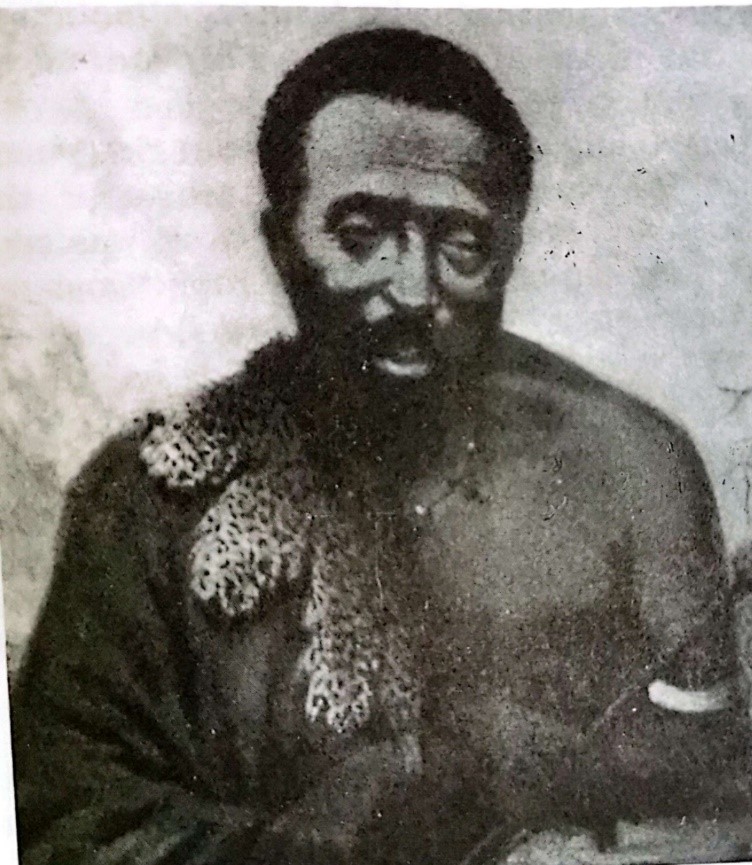SARILI
- 4 Min Read
Sarili (circa 1815-1892), son of Hintsa, was the 11th king of the Xhosa, in direct line of succession to Tshawe, and the last independent ruler of the AmaGcaleka in the 19th century. He was forced to flee to Bomvanaland after the War of Ngayechibi which proved to be the final Frontier War. He died among the Bomvana in February 1892.

PHOTO CAPTION: Sarili. SOURCE: EA Library
Sarili succeeded to the kingship in 1835 after the brutal murder of his father Hintsa at the Ngabara River. A well-built man with a dextrous mind, Sarili was an esteemed leader, a good warrior and a skillful diplomat. Sarili also held a grudge against the AbaThembu, who had assisted the British during the War of Hintsa, and who occupied the region of the Upper Kei.
Sarili’s attempt to recapture this area in 1839 failed, but in July 1843 Sarili led his Gcaleka armies into battle against the AbaThembu and their allies the AmaPondomise. In January 1844, Sarili inflicted a major defeat on the Themnbu-Pondomise allied armies. Sarili secured compensation in cattle and established his capital at Hohita in the recaptured territory. Sarili had encouraged his followers to incorporate guns and horses into their military operations.
At the peace conference of 1846, he outmaneuvered Sir Andries Stockenstrom in negotiations and caused a divisive rift between Stokenstrom and his second-in-command. The British concluded a treaty favourable to Sarili in 1848 following the War of the Axe.
Sarili, who had vowed to revenge his father’s cruel death and who resented the annexation of the lands between the Kei and the Keiskamma to the Cape Colony, saw an opportunity to attack the British during the War of Umlanjeni, (1850-53).
Armed Khoi soldiers under Jan Hermanus and Xhosa police deserted the colonial forces with their guns and joined the independent AmaXhosa. Despite this Khoi-Xhosa alliance, Sarili’s followers suffered heavy losses in men and cattle when attacking the colony.
Following an unfavourable peace settlement in 1854 Sarili was again at war with the AmaThembu. The AmaGcaleka were again victorious as a result of Sarili’s brilliant military strategy.
The memory of his father’s death still rankling in his mind, Sarili, in desperation, listened to and believed the prophecies of Nongquase which promised that the whites would be driven back into the sea. The cattle-killing tragedy which followed in 1857 only weakened the ability of the AmaGcaleka stood up to the British colonists.
Many people died and many destitute Xhosa sought work in the white-owned farms in the colony. Yet, in the very next year, 1858, Sarili rallied the AmaGcaleka against the AbaThembu. He again led Gcaleka armies against the AbaThembu in 1875 because the Thembu king had ill-treated his wife, Sarili’s daughter.
The final war with the British colony began with a minor quarrel between the AmaGcaleka and the AmaFengu during a wedding feast at the home of Ngayechibi. Sarili’s attempt to stop the outbreak of hostilities failed when colonial troops surprised him as he addressed a war council urging moderation at Gwadana plain.
The Gcaleka warriors attacked and defeated the colonial forces and hostilities began which ultimately drew Sandile’s AmaRharhabe into the war on Sarili’s side. Sarili, who was never enthusiastic about the war was defeated at the Battle of Ibeka.
Sandile was killed and Xhosa military power was broken. Sarili fled across the Mbashe and sought refuge among the Pondo. He later returned to take refuge among the Bomvana until he was granted his own locations in 1885.
He quietly livedbout his days in these areas, having guided the AmaGcaleka through the major period of the Frontier Wars which led to African dispossession.
C. TSEHLOANE KETO





